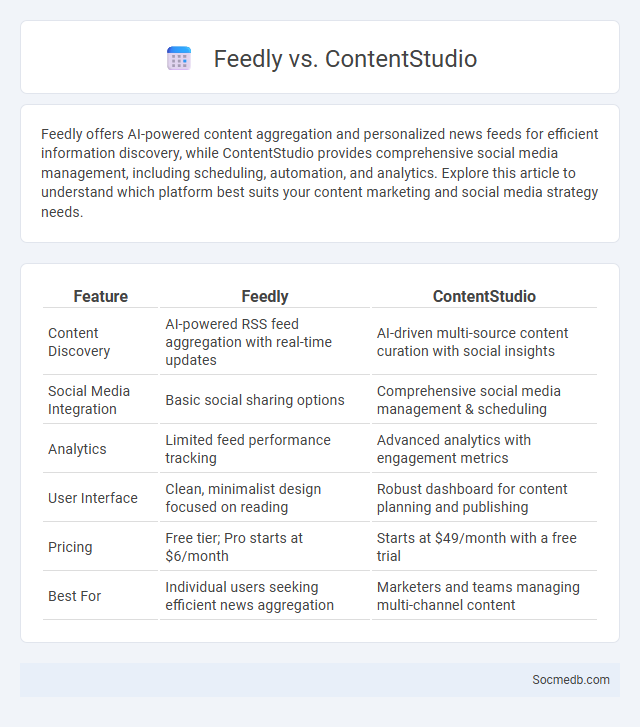
Photo illustration: Feedly vs ContentStudio
Feedly offers AI-powered content aggregation and personalized news feeds for efficient information discovery, while ContentStudio provides comprehensive social media management, including scheduling, automation, and analytics. Explore this article to understand which platform best suits your content marketing and social media strategy needs.
Table of Comparison
| Feature | Feedly | ContentStudio |
|---|---|---|
| Content Discovery | AI-powered RSS feed aggregation with real-time updates | AI-driven multi-source content curation with social insights |
| Social Media Integration | Basic social sharing options | Comprehensive social media management & scheduling |
| Analytics | Limited feed performance tracking | Advanced analytics with engagement metrics |
| User Interface | Clean, minimalist design focused on reading | Robust dashboard for content planning and publishing |
| Pricing | Free tier; Pro starts at $6/month | Starts at $49/month with a free trial |
| Best For | Individual users seeking efficient news aggregation | Marketers and teams managing multi-channel content |
Overview of Feedly, ContentStudio, and Content Curation
Feedly streamlines information gathering by aggregating content from diverse sources into organized feeds, helping you stay updated efficiently. ContentStudio enhances social media management through features like content discovery, scheduling, and analytics, empowering your strategic content planning. Content curation tools combine these capabilities by enabling users to collect, filter, and share relevant content, boosting engagement and brand authority across platforms.
Key Features Comparison: Feedly vs ContentStudio
Feedly offers powerful RSS feed aggregation with AI-driven content recommendations and a clean, user-friendly interface for efficient content curation. ContentStudio excels in multi-platform social media management, featuring advanced scheduling, analytics, influencer discovery, and collaboration tools tailored for marketing teams. Both platforms support integrations with popular apps, but Feedly specializes in content discovery while ContentStudio emphasizes comprehensive social media publishing and engagement.
User Interface and Experience Analysis
Effective social media platforms prioritize intuitive user interface (UI) design and seamless user experience (UX) to engage and retain users. Key elements include clear navigation, responsive layouts, and personalized content feeds that adapt to Your behavior, enhancing usability and satisfaction. Continuous UX analysis using user feedback and behavioral data drives improvements that optimize interaction flow and reduce friction.
Content Discovery Capabilities
Social media platforms utilize advanced algorithms to enhance content discovery capabilities, tailoring recommendations based on user behavior, preferences, and interaction history. These predictive systems analyze vast datasets to present highly relevant posts, videos, and articles, ensuring You encounter engaging and personalized content that increases user retention. Enhanced content discovery not only drives community growth but also boosts brand visibility and user engagement metrics.
Automation and Workflow Tools
Automation and workflow tools streamline social media management by scheduling posts, tracking engagement, and analyzing performance metrics to optimize content delivery. You can use platforms like Hootsuite, Buffer, or Zapier to automate repetitive tasks and integrate various apps, enhancing efficiency and consistency across multiple accounts. Leveraging these tools maximizes ROI and allows more time for creative strategy development.
Integration With Third-party Platforms
Integrating social media with third-party platforms enhances user engagement and streamlines content sharing across multiple channels such as WordPress, Shopify, and HubSpot. APIs and webhooks facilitate seamless connectivity, enabling automated posting, real-time analytics, and unified customer management. Businesses leveraging integration tools like Zapier or Hootsuite experience improved workflow efficiency and amplified brand visibility.
Pricing and Plans Breakdown
Social media platforms offer various pricing plans tailored to different user needs, ranging from free access with basic features to premium subscriptions that include advanced analytics, ad management, and enhanced content creation tools. For example, LinkedIn Premium plans start at $29.99 per month, offering features like InMail messaging and profile insights, while Facebook Ads operates on a pay-as-you-go model with customizable budgets. Understanding each platform's pricing structure helps businesses optimize their marketing spend and maximize return on investment through targeted campaigns and detailed performance tracking.
Ideal Use Cases for Each Tool
Facebook excels in building communities and targeting detailed audiences through groups and events, proving ideal for local businesses and brand awareness campaigns. Instagram is optimized for visually-driven content, making it perfect for influencers, fashion brands, and product showcases focused on younger demographics. LinkedIn serves professional networking, B2B marketing, and thought leadership, effectively connecting industry experts and decision-makers.
Pros and Cons: Feedly vs ContentStudio
Feedly offers an efficient way to aggregate and organize content from multiple sources, helping you stay updated with relevant industry news through its powerful RSS feed capabilities. ContentStudio provides advanced social media management tools such as scheduling, analytics, and content discovery, ideal for businesses aiming to streamline their social campaigns. Your choice depends on whether you prioritize content curation with Feedly or comprehensive social media automation with ContentStudio.
Choosing the Best Content Curation Solution
Choosing the best content curation solution for social media involves evaluating platforms based on algorithm accuracy, ease of integration, and customization options. Key features to prioritize include real-time content discovery, multi-channel publishing capabilities, and advanced analytics for engagement tracking. Solutions like Feedly, Scoop.it, and Curata are favored for their robust filtering tools, user-friendly interfaces, and scalability for diverse social media strategies.
 socmedb.com
socmedb.com